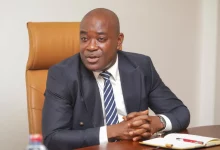A number of water bodies in some parts of the country have been polluted due to illegal mining activities, popularly known as galamsey.
For instance, River Pra and River Ankobra, which serve as the main sources of drinking water in the Western Region, and the Birim River in the Eastern Region have all been polluted.
The situation is not different from Cape Coast in the Central Region where some water bodies have been polluted due to galamsey activities.
Other polluted rivers are Enu River, which serves residents of Konongo in Ashanti and the Black Volta in Upper West Region.
The Ghanaian Time is concerned about the activities of illegal miners and thinks that galamsey is a major threat to the survival of the county’s water resources and the general environment.
The paper, therefore, welcomes the position taken by stakeholders at the National Consultative Dialogue on Small-scale Mining in Accra last week that galamsey is a “national emergency” that must be tackled urgently through a concerted effort.
They charged the government to take steps to put in place systems that would rigidly apply the law.
Referring to the penalties imposed by Act 995 on those who infringe the law, irrespective of political colour or socio-economic status, the stakeholders argued that those who violate the law must be punished severely to serve as a deterrent to others.
Indeed, illegal mining activities have caused degradation of lands, in many cases leaving numerous uncovered well-filled and dangerous pits scattered across the country.
The Ghanaian Times welcomes assurance by the Minister of Lands and Natural Resource, Samuel Abu Jinapor, that the government would deal drastically with any individual or group that frustrates its efforts to fight galamsey.
“This is a national effort and national responsibility. President Akufo-Addo has made it clear that the law must be applied without fear or favour. It doesn’t matter which government appointee or party official or leader is involved,” the minister is said to have emphasised at the National Consultative Dialogue on Small-scale Mining Dialogue.
It is necessary for the regional security councils to team up and strategise to deal with illegal mining by promptly arresting and prosecuting those involved in the menace
There is the need to involve both Security Council members and traditional authorities in decisions regarding the management of water resources, including good sanitation practices that would stop the public from throwing rubbish into drains and which eventually get into rivers.
Intensive education on illegal mining would help deal with the menace.
We must also sensitise illegal mining operators to the risk their activities pose to future generations.
Well planned awareness creation and behavioural change among these illegal miners could go a long way to halt the menace.
Nevertheless, alternative jobs or livelihood activities should be created by the government to get such illegal miners engaged in them to protect water bodies from pollution and our land and forests from degradation.




